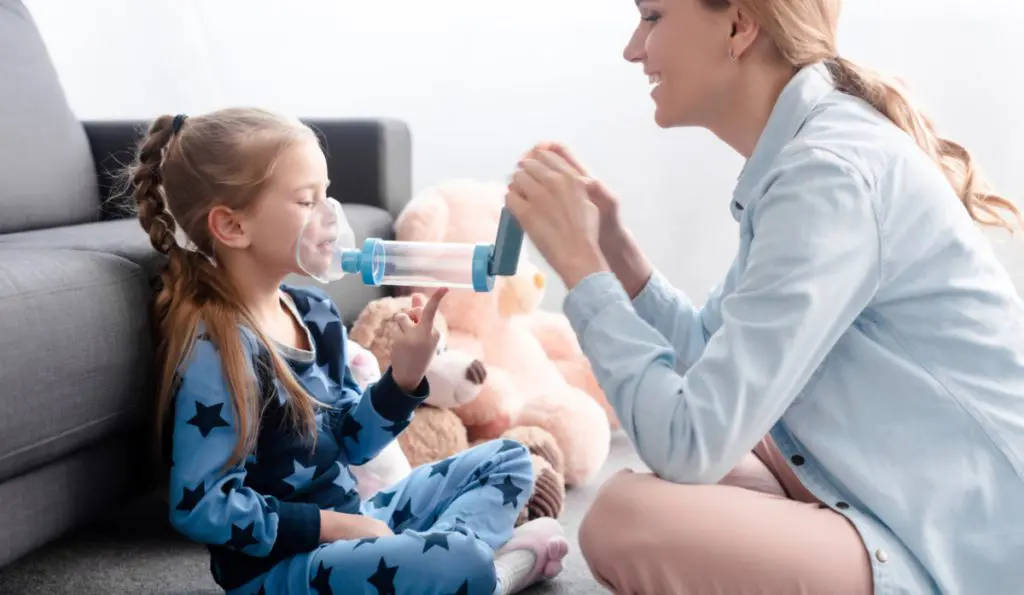Overview
Asthma is a common disease, affecting 6 million children in the United States, according to the Centers for Disease Control and Prevention. If asthma isn’t well-controlled, children may need to go to the emergency department or be hospitalized. That can be scary for children – who often don’t understand what is happening – and for you as a parent.
The good news is you can help control your child’s asthma to ensure they live a healthy and active life. An allergist can work with you to develop an asthma action plan that will help your child do everything other children can do, including sports and other activities.
Find expert care.
Don’t let allergies or asthma hold you back from the things you love.
Symptoms
You can get asthma at any age, and it is not contagious. During an asthma attack, the tubes that carry air to the lungs become swollen, get squeezed and make extra mucus, which makes it harder to breathe.
The signs of asthma can range from a cough that lingers for days or weeks to a sudden and scary inability to breathe effectively. Common signs include:
- Coughing, especially at night
- A wheezing or whistling sound, especially when breathing out
- Trouble breathing or fast breathing that causes the skin around the ribs or neck to pull in tightly
- A tight chest
- Frequent colds that settle in the chest
Your child might have only one of these symptoms or several of them. You may think it’s just a cold or even bronchitis. But if the symptoms recur, it’s time to see an asthma specialist, such as an allergist.
In addition, symptoms may get worse when your child is around asthma triggers, such as irritants in the air, pollen, pet dander, dust mites, weather changes, and viral infections such as colds. Avoiding triggers when possible can help reduce asthma attacks in your child.
Diagnosis
Tell your child’s pediatrician if anyone in your family has asthma or allergies because both tend to run in families. If a family member has asthma or allergies, it’s more likely that your child will have them.
Asthma is typically diagnosed through a medical exam and a test that measures airflow in and out of the lungs. Diagnosing children can be challenging, especially when they are very young. Children who are preschool age or younger may not be able to complete the airflow test, which requires blowing very hard into a tube. And infants and toddlers can’t describe how they feel. This makes it especially important for parents, other family members and caregivers to know the signs of asthma.
Your allergist may perform skin or blood tests to see whether your child has allergies that can trigger asthma symptoms. These tests can be done at any age. Your allergist may also prescribe one or more asthma medications depending on the severity of the asthma.
No parent wants to see their child suffer. If your son or daughter is struggling with asthma, take control of the situation and consult an allergist today.
Treatment and Management
It’s very important that children with asthma receive proper treatment. An allergist can help your child achieve long-term control by working with you to create an action plan. With the right treatment, your child can sleep through the night, avoid missing day care or school and breathe more easily. The action plan will help you recognize when your child’s asthma is under control, when you need to change medicines and when emergency help is needed.
I definitely think seeing an allergist has freed Taylor up and changed her life for the better.
Taylor’s mom
Your child’s treatment will depend on the severity and frequency of their symptoms. Your allergist might prescribe two types of medicines:
- Quick relief (relievers): All children with asthma need quick-relief medicine to treat coughing, wheezing and shortness of breath or an asthma attack. Your child should have this medicine with them (typically an inhaler) at all times and use it at the first sign of symptoms.
- Preventative (controllers): Many children with asthma also need to take a controller daily to prevent asthma symptoms and attacks. Your child may need a controller if they are using quick relief medication too often or frequently needing oral corticosteroids such as prednisone for asthma attacks.
Medications your child may be prescribed include:
- Inhaled corticosteroids, which are the first-line treatment, are safe, and well-tolerated and are among the most effective medications for treating asthma
- Antileukotrienes or leukotriene modifiers, which are oral medications that can help prevent asthma symptoms
- Long-acting inhaled beta2-agonists, which are never taken alone, but can be very useful when combined with an inhaled corticosteroid
- Biologics, which treat severe, uncontrolled asthma when other preventative medicines don’t work. Currently, five biologic drugs are Food and Drug Administration-approved for treating asthma in children: dupilumab, mepolizumab and omalizumab (for ages 6 and up) and benralizumab and tezepelumab-ekko (for ages 12 and up). Your child’s allergist will do blood tests to determine which biologic would be the most effective for your child. Depending on the biologic recommended, your child will receive an injection of the medication under the skin as often as every two weeks.
Children often take reliever and controller medicines using an inhaler with a spacer, which makes it easier to use the inhaler. Another option is a nebulizer – a machine that includes tubing and a mask to help deliver the medication. Your allergist, nurse, or pharmacist can teach you and your child how to use both, so you can determine what works best for them.

Asthma medicines are very safe and effective when used as directed. Some studies have suggested that continued use of long-term control medicines can slightly slow growth in children, but it is vital to their health to treat their asthma symptoms.
Children with asthma should get a flu shot every fall. Even though the injected version of the vaccine contains a very small amount of egg protein, it is safe for children who have egg allergy.
Work with your child’s teacher and other school staff to make sure they are aware of your child’s asthma action plan and they know what to do if your child has an asthma attack. Your school should have policies in place to make sure your child can have their asthma medications available should they need them. School personnel may keep a supply of certain asthma medications in the nurse’s office. Involve coaches and other caretaking adults in the plan. Talk with your child about the asthma action plan for school and for other places where the child spends time without you. Teach your child what to do if they have an asthma flare-up, if they find themselves around allergens or other triggers or if they forget their medicine. Working with your child’s caregivers and following the action plan ensures you and your child can control their asthma so they can do everything other children can do. For more information about treatment for your child’s asthma, visit an allergist.
